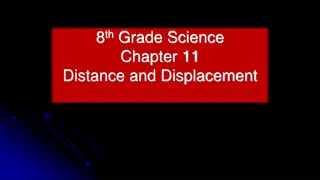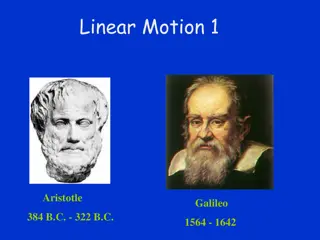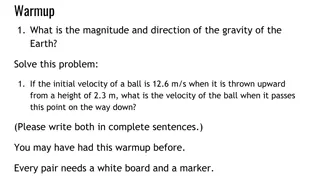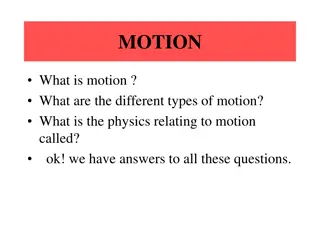New Higgs Bosons and Physics Beyond the Standard Model
Discoveries of new Higgs bosons at the electroweak scale, hints for new scalars at 95 GeV and 151.5 GeV, investigations into the nature of the 151.5 GeV Higgs as a triplet, and analyses of top-quark distributions at the LHC hint at exciting possibilities for physics beyond the Standard Model. ATLAS
0 views • 21 slides
Understanding Distance and Displacement in Science
Exploring the concepts of distance and displacement in science, this content covers the difference between scalar and vector quantities, methods for determining displacement and distance, and examples of scalars and vectors. It also delves into the fundamental definitions of distance and displacemen
0 views • 21 slides
Understanding Linear Motion in Physics
Explore the concepts of linear motion in physics through the teachings of Aristotle and Galileo. Learn about scalars and vectors, distance versus displacement, examples of displacement calculations, and speed versus velocity distinctions. Engage in conceptual tests to deepen your understanding of th
0 views • 27 slides
Introduction to Vectors and Scalars in Physics
Explore the concept of vectors and scalars in physics through a series of warm-up exercises, quizzes, and group problems. Understand the differences between quantities with magnitude and direction versus those with magnitude only. Practice solving problems involving velocity, displacement, and more
0 views • 25 slides
Understanding Four-Vectors in 4D Space
Explore the concept of four-vectors in four-dimensional space, covering topics such as radius vectors, general 4-vectors, contravariant and covariant components, summation conventions, scalar products, and the components of a general 4-vector. Learn how these vectors transform under rotations and Lo
0 views • 42 slides
Numerical Solution of Eulerian Advection Equation in 1-D Operator Splitting
Application of operator splitting over three directions allows reducing the Eulerian advection equation to 1-D, enabling finite differencing of derivatives while maintaining conservation properties. Various numerical schemes like forward Euler, leapfrog, and linear upstream are discussed, highlighti
0 views • 8 slides
Understanding Motion: Types and Physics
Motion refers to a body changing position with respect to its surroundings. Different types of motion include linear, rotatory, and oscillatory motion. The physics relating to motion is called Mechanics, which comprises Dynamics and Kinematics. Scalars and vectors play a crucial role in describing t
0 views • 8 slides






